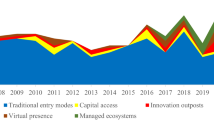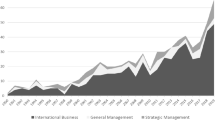Abstract
There is an Igbo saying that the world is a marketplace (uwa bu ahia). This simple worldview can be explained literally to mean that the Igbo think so because trading is a prominent occupation among the Igbo (it could also mean that a marketplace is the epicenter of community social and business interaction). That might be why the Igbo weekdays are named after their markets – Eke, Orie, Afo, Nkwo. Children born on any of these market days often assume the default name as in Okeke or Mgbeke, Okorie or Mgborie, Okafo or Mgbafo, Okonkwo or Mgbonkwo for male or female children, respectively, born on the corresponding market days. We are yet to come across another culture for which the market holds such a fascinating centrality in their worldview even while they see themselves as ruggedly egalitarian. The meaning of the thesis statement that the world is a marketplace is deeper than the literal interpretation. The deeper meaning is the suggestion that all the problems we encounter in this world are open to negotiation, haggling and bargaining. Some people come into the market place with greater resources than others and therefore are able to buy more goods and services just as some people are born or raised with greater resources, increasing their bargaining power in the global marketplace. When the Igbo say that the world is a market, they usually complete the sentence by observing that when one buys to one’s content, one goes home. The home referred to here is the land of the ancestors to which the Igbo believe the spirits of the dead return to bargain for a better life in their next incarnation. If one’s creator dealt one a raw deal in this life, one can still bargain with his/her personal God (or Chi) and haggle for a better break in the next life. In other words, the Igbo intend the paradox that the world is a market as a description of the global world and not simply just the Igbo world. This paper will focus on how the Igbo organize the training of children in commercial and consumerist activities given their mercantilist worldview. Are there lessons that other cultures could learn from the Igbo and are there lessons that the Igbo could learn from the social structure of modernist business schools?
Similar content being viewed by others
References
Achebe C. The Trouble With Nigeria (Enugu: Fourth Dimension, 1983)
Agozino B., Black Women and the Criminal Justice System: Towards the Decolonization of Victimisation (Ashgate: Aldershot, 1997)
Amadiume I., Daughters of the Goddess, Daughters of Imperialism: African Women, Culture, Power & Democracy (London: Zed, 2000)
Bauman Z., Modernity and the Holocaust. (Cambridge: Polity, 1989)
Davidson B., A history of West Africa 1000–1800. (London: Longman, 1981)
E. Durkheim, The Division of Labor in Society (G. Simpson, Trans.) (New York: Free Press, 1947)
T. Eagleton, “In the Gaudy Supermarket,” in London Review of Books, vol. 21, No. 10, 31 May 1999
Fieldwork notes by Ekperechi Anwana, MBA student, Enugu, Nigeria
Garland, D., Punishment in Modern Society: A Study in Social Theory, (Oxford: Clarendon, 1990)
A. Little, ‹Nigeria’s “Respectable” Slave Trade’ From Our Own Correspondent, broadcast on Saturday, 17 April, 2004 at 1130 BST on BBC Radio 4
Marx K. Capital. (Moscow, Progress Press, 1954)
J. C. McCall, “Madness, Money, and Movies Watching a Nigerian Popular Video with the Guidance of a Native Doctor,” Africa Today 49(3)
B. Nwabueze, The Igbos in the Context of Modern Government and Politics in Nigeria: A Call for Self-Examination and Self-Correction (Ahiajioku Lecture, Owerri: Imo State Government, 1985)
I. Onwudiwe, “Transnational Crimes: The Case of Advanced Fee Fraud in Nigeria,” in B. Agozino and A. Kalunta-Crumpton, eds., Pan African Issues in Crime and Justice (Ashgate: Aldershort, 2004)
C. A. Onwumechili, Igbo Enwe Eze: the Igbo Have no Kings (Ahiajioku Lecture, Owerri: Imo State Government, 2000)
V. C. Uchendu, Ezi na Ulo: The Extended Family in Igbo Civilization (Ahiajioku Lecture, Owerri: Imo State Government, 1995). See also V. C. Uchendu, The Igbo of South East Nigeria (New York: Thompson International Publishing, 1965)
C. C. Ukaegbu, “Entrepreneurial Succession and Post-Founder Durability: A Study of Indigenous Private Manufacturing Firms in Igbo States of Nigeria” Journal of Contemporary African Affairs 21(1), 27–45
M. Weber, The Protestant Ethic and the Spirit of Capitalism (T. Parsons, Trans.) (New York: Scribner’s, 1958)
Author information
Authors and Affiliations
Corresponding author
Additional information
With fieldwork by Mrs Ekperechi Anwana Business Executive and MBA student in Finance, University of Nigeria, Enugu Campus, Nigeria. Phone: 234-80-368-67280.
Rights and permissions
About this article
Cite this article
Agozino, B., Anyanike, I. IMU AHIA: Traditional Igbo Business School and Global Commerce Culture. Dialect Anthropol 31, 233–252 (2007). https://doi.org/10.1007/s10624-007-9023-8
Received:
Accepted:
Published:
Issue Date:
DOI: https://doi.org/10.1007/s10624-007-9023-8




